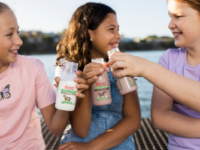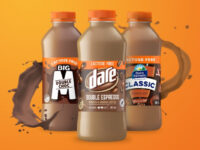 A who’s who of FMCG companies and major supermarkets have joined together behind a call-to-action to simplify date labels on grocery products globally by 2020.
A who’s who of FMCG companies and major supermarkets have joined together behind a call-to-action to simplify date labels on grocery products globally by 2020.
The move, supported by the likes of Nestle, Campbell Soup, Kellogg, Unilever, Carrefour, Walmart and Tesco, could see terms like “sell by”, “display until”, and “best before” done away with in the coming years.
Instead, two labels would be adopted, one for perishable items (e.g. “use by”), and one for food quality on non-perishable items (e.g. best if used by”).
Only one label at a time would be used and a consumer education program will be launched to help shoppers around the world understand what the date labels mean.
The push is being spearheaded by The Consumer Goods Forum (CGF), who announced the multi-year campaign at the Champions 12.3 event today.
“Now more than ever is the time for business to play a leading role in tackling food waste. This is an issue that can only truly be tackled by collaboration across the value chain,” CGF managing director Peter Freedman said.
“We believe simplified and consistent date labelling will help us get one step closer to meeting our resolution to halve food waste by 2025 while also helping reduce confusion for consumers.”
The announcement expands efforts to streamline date labels in the United States, United Kingdom and Japan.
Confusion over date labels on food products costs families up to $29 billion annually in the United States alone, the forum, which represents 400 of the world’s largest retailers and manufacturers from 70 countries, said.
“Kellogg Company is working to reduce food loss and waste along the production and supply chains, and we want to encourage consumers to be part of the solution too. As a global food company, we work to reduce hunger, improve nutrition and protect the planet,” said Maria Fernanda Mejia, senior vice president of the Kellogg Company and president of Kellogg Latin America.
“Simplifying food date labels is an important step forward in preventing food waste, and will help end the confusion related to ‘sell by’ dates. Kellogg is an enthusiastic supporter of improved and harmonised food labelling standards to help educate and empower consumers to prevent food waste, save their families money, and conserve resources to protect our planet.”
An estimated 1.3 billion tonnes of food worldwide is lost or wasted each year. The average UK household with children spends £700 a year on food wastes while in the US they spend $1,500.
CGF said standardising food date labels will help reduce the amount of edible food thrown out by households, which will help cost cut on budget and also reduce their environmental footprint. Food loss and waste are major contributors to climate change as it produces 8 per cent of annual greenhouse gases.
“Four years ago, Tesco was one of the first retailers to roll out single date coding across our fresh food and meat produce. All the evidence from WRAP and our own Tesco research has shown that streamlining date codes helps customers waste less food and it also reduces waste in our own operations. That’s why it’s so important we extend this practice to more companies in every country. Streamlining date labels worldwide by 2020 could be game-changing in the fight against global food waste,” said Dave Lewis, group chief executive of Tesco and chair of Champions 12.3.
















